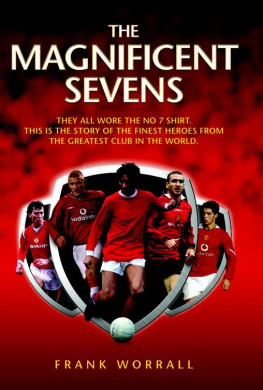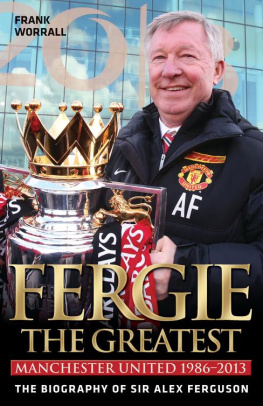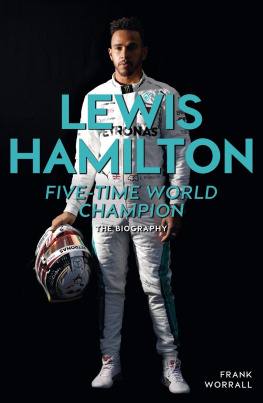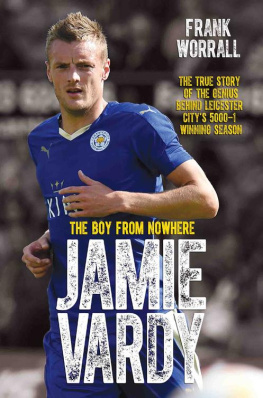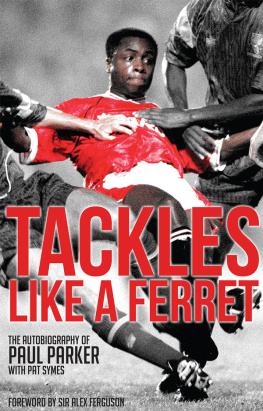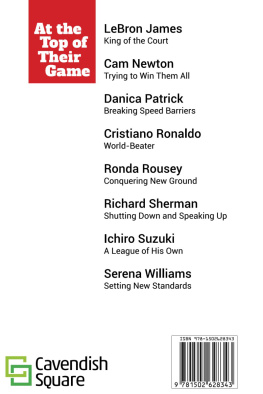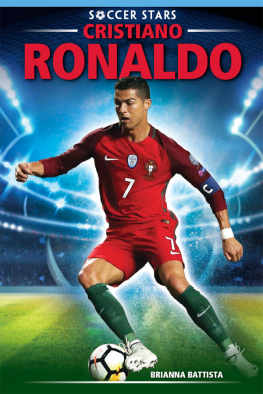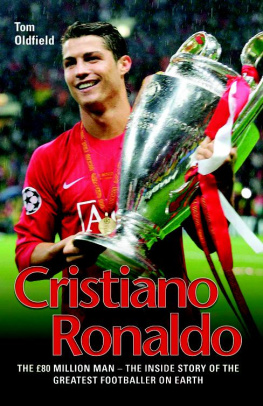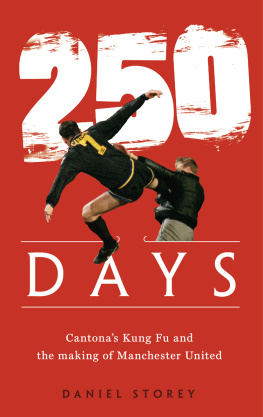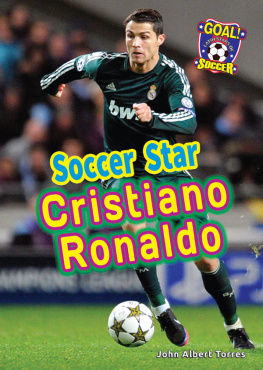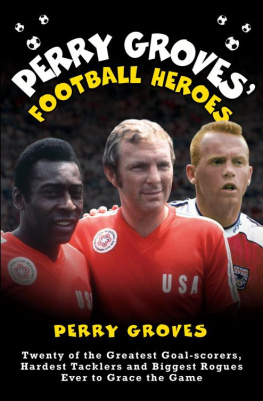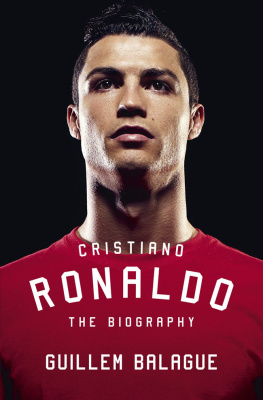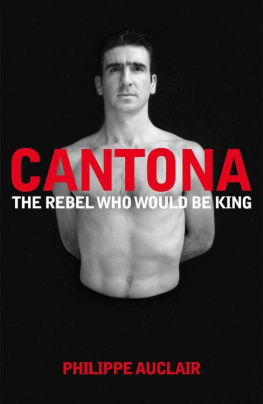First-Teamers Angela, Natty, Bob, Gill, Alex and Lucy, Stephen, Suzanne, Michael and William, Frank Sr and Barbara, Roz Hoskinson
Supporters Tim Smith, Derek Whitfield, Nic Petkovic, David Michael, Collin Forshaw, Russell Forgham Adrian Baker, Pravina Patel, Alan Tovey, Duncan Craig, Ian Rondeau, Mike OBrien, Hugh Sleight, Steven Gordon, David Burgess, Roy and Pat Stone, Tom Henderson-Smith, Lee Hassall, Bill, Sharon and Grace, Chase, Debbie and Miles, Emma Lloyd, Sam Wostear, Natasha Harding of the Sun, Chris Godfrey, Liz Burcher, Paul Collett and Darren ODriscoll.
M anchester United much to the joy of their followers and dismay of their bitterest opponents remain the biggest club in the world. From Old Trafford to the Far East, no other football club can match their popularity and unrivalled support. And just as the Red Devils themselves are the stuff of legend, so is the coveted number 7 shirt at the club. It all started when Georgie Best decided it was his favourite number in the late Sixties and early Seventies. Yes, I know he also in his time wore 8 and 11, but it was the 7 shirt that will forever be associated with his greatest triumphs and memories.
Georgie-boy started off a trend that would encompass the greatest players of the next four decades Bryan Robson in the Eighties, Eric Cantona in the early Nineties, and then David Beckham in the late Nineties and into the millennium. They were all eager to make their mark and earn a place in history as one of Uniteds fabled Magnificent Sevens.
Now Cristiano Ronaldo who is as much loved by United fans and as reviled by rivals as the club itself after his exploits in the World Cup of 2006 is the latest to pull on the iconic number 7 shirt and claim he is worthy of it.
All five men have something else in common they have another side to them, not so much bad as mischievous and controversial. Indeed, it is this darker side that elevated them into the world-beaters they all became, that fuelled their very tunnel-visioned obsession to succeed. They were giants on the field, but human beings struggling with the enormity of a fame few of us can imagine off it. George Best reacted by frequently going AWOL to escape the pressure; Robson liked a drink or two; Beckham and Alex Ferguson famously often did not see eye to eye; Cantonas frustrations erupted in angry outbursts, culminating in his infamous kung-fu kick on a taunting fan; and Ronaldo sent England crazy with his petulance, wicked winks and diving.
Could we have chosen other Sevens? Well, trawling the record books, there were only three other decent candidates Johnny Berry from the Busby Babes era, Willie Morgan from the Seventies and Stevie Coppell, also from the Seventies and early Eighties. But none of them had the edge to become one of the Sevens they were, for the most part, what-you-see-is-what-you-get characters. They did not have the devil in them that went hand in hand with genius.
Berry was not a true Babe, in that he was not United bred. He was bought in from Birmingham for 15,000 aged 25 in 1951 and retired from the game after Munich seven years later. In his time at Old Trafford, he made 276 appearances and scored 45 goals and was renowned as being a tricky little winger with a lot of guts. As team-mate Dennis Viollet would say of Johnny, who played four times for England, No one had more heart than Berry.
Willie Morgan was another who gave fine service, but who was hardly of the calibre of George Best, the man he was brought in to replace from Burnley for a fee of 100,000 in 1968. Willie made 304 appearances for United, grabbing 34 goals, and represented his country, Scotland, at the 1974 World Cup Finals.
Stevie Coppell who took over from Morgan at Old Trafford was another right-winger renowned for his speedy, direct play. Of the three outsiders for a place in the Magnificent Sevens hall of fame, he remains my personal favourite an intelligent, constructive player who lit up the Tommy Docherty era of bright, attacking football. Coppell made 496 appearances for United, scoring 70 goals after joining the club from Tranmere for 60,000 aged 20 in 1975. Coppell, who earned 42 England caps, is also famed for appearing in a Manchester United club record 206 consecutive league games between 15 January 1977 and 7 November 1981.
Yet Berry, Morgan and Coppell the cream of the outsiders for a place in the Magnificent Sevens remain decent bread-and-butter men in comparison to the five greats Best, Robson, Cantona, Beckham and Ronaldo five names you would surely gladly move heaven and earth to see even in this era of high prices and high-tech alternatives. With the help of new interviews and material, my aim is to cast a fresh eye over the famous five who make up Uniteds Magnificent Sevens and to shed new light on their achievements, their failings and their ultimate legacies.
Frank Worrall, 2008
(1946-68)
I was born with a great gift, and sometimes with that comes a destructive streak. Just as I wanted to outdo everyone when I played, I had to outdo everyone when we were out on the town.
GEORGE BEST
Unquestionably the greatest.
SIR ALEX FERGUSON
T he more I examine the evidence, the more I arrive at a rather unexpected conclusion: the closest model we have in modern-day football to George Best is Roy Keane. Not in terms of their skills or defined role on the pitch itself, of course, but certainly if youre talking about their psyche. Best and Keane had problems at both club and international level when their respective Manchester United and Irish teams went into decline. Their innate professionalism or maybe you would call it their search for perfectionism meant they could not tolerate playing with men they saw as losers.
Up until 1968 and for this books purpose, Georges life story splits obligingly into the glory years until that wonderful Wembley night and his subsequent downfall until he died in 2005 Best did exactly as it said on the tin. He was simply the best possibly in the world and was certainly a marvellously innovative pioneer of the glorious magic surrounding Uniteds number 7 shirt. Yet after the European Cup win against Benfica in 1968, having been named European Player of the Year and Football Writers Player of the Year, he self-combusted. As United struggled with an ageing, no-longer hungry team, he lost his motivation. That nagging inner dynamo that perpetually spurred him on to be the best meant he could not bear to be in a team that would never again reach the same dizzying heights.
Now, lets consider Keane the footballer, who won a European champions medal in 1999 and was never to reach the same heights as a player again. Even that dreamy night in Barcelona left Keane with a nagging feel of failure; he would always maintain he did not deserve a winners gong as he had been ruled out of the final due to suspension. After 26 May 1999, Roy Keane would continually strive to earn that medal and Uniteds failure to take him there would lead to his open criticism at what he saw as the underperformance of his colleagues up to 2005, and his ultimate sacking by Sir Alex Ferguson for speaking out once again in November of that year.
The similarity of the two United icons is also mirrored in their international careers. George Best got sick of turning out for Northern Ireland because he knew they would never achieve anything of note. He would miss games for his country under the pretence of injury rather than play in a poor side. Likewise, Keane blew up over the inadequacies he found in the Republic of Irelands approach to matches and tournaments. He publicly perceived it to be an amateurish were only here for the craic approach that turned his stomach and made him ashamed to be an Irishman. It would lead to the furore in the 2002 World Cup Finals and the bust-up with Mick McCarthy that saw him sent home.

